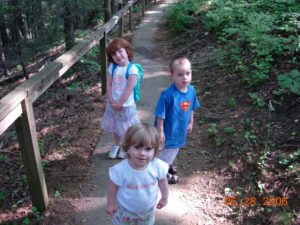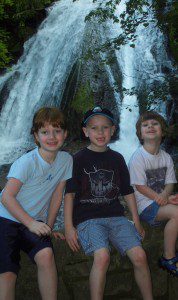
Their first hike ever–May 2006 at the Roanoke River trail. Our kids were just 2, 3, and 4!
Outside of a brief stint with aerobics during my college years, I have never been what you’d call an “active” person. Any activity that involved sweating was definitely not for me, which naturally ruled out most sports. As for the “great outdoors,” I was happy to explore God’s creation—from the comfort of my car. To me, any locale that boasted about its hiking opportunities always seemed like it was trying to hide the fact that it had no real attractions for visitors.
Then I had three children in three years. Those first few years, just getting everyone dressed, in the car, and strapped in required Pentagon-style planning. Actually making it to our destination was another goal entirely. Who needs a gym when you crash from exhaustion every evening by seven?
But things change with kids so quickly. My crawlers and toddlers graduated from diapers to undies, from sippy cups to water bottles. And unlike me, they had an almost psychological need for physical activity or their behavior deteriorated into whining and squabbling that soon had me whining and squabbling. It was this need that led even me, someone who gets intense pleasure out of being sedentary, into the woods. We have become, of all things, a family that hikes.

Hiking in 2007 on the hill my kids dubbed “Horse Poop Mountain.” I assume I don’t need to explain why.
It started one bright summer morning about five years ago. I was trying to find a physical outlet for the kids that wouldn’t cost much. The movies were out on both counts. So was the wine-tasting downtown. Browsing the newspaper, I saw an article about an easy hiking trail just minutes outside the city. Bingo! I packed some snacks, strapped on a cell phone, and grabbed a map.
Half hour later, we were all traipsing through a leisurely loop of God’s big backyard, my kids shrieking with delight as if these were the first trees and rocks they’d ever seen. A centipede mid-trail became an instant science lesson. A huge, warty toad crouched atop a boulder spurred a theological discussion, such as “What was God thinking when he made that?” The kids took turns leading the group while I handled risk management from the back. And before I knew it, I found myself actually enjoying this physical, outdoor activity.
Lest I give you the wrong idea: Yes, someone had to go to the bathroom halfway down the trail. No, I didn’t remember to bring band-aids for the scraped knee. Yes, the 2-year-old got tired and whiny by the end. But I could tell from the exhausted silence on the way home that the trip was a success. The kids meticulously arranged their treasures of acorns and leaves on their dressers, then crashed for afternoon naps. And that was it—we were officially hooked on hiking.

In 2008 at Roaring Rock Falls, one of our favorite spots.
The benefits to hiking with kids are almost too numerous to mention. Besides being a great physical outlet for children’s boundless energy, the opportunities for bonding and meaningful conversations can’t be beat. One fall four years ago, our son died halfway through the pregnancy and the loss especially devastated our then six-year-old daughter. Hiking carved out the one-on-one time we both needed to process the grief and feel closer to God during that intense suffering.
Fortunately, the values learned on the trail don’t stay there. My children are just plain kinder to one another after a morning of hiking. It probably has something to do with having a “trail buddy,” who has the responsibility of helping you past the rough spots and picking you up if you fall. Can there be a better metaphor—or practice—for the journey of life?
Hiking has served to make my kids more responsible, too. Show your child a piece of trash on the trail and watch their reaction. Children instantly perceive that a carelessly tossed empty bottle or wrapper sullies the natural beauty of the forest. My kids probably think littering is a mortal sin for all the attention I’ve given it. But keeping the outdoors clean for other people is no different than keeping the indoors clean for the family and friends, is it? A child who is taught to appreciate God’s natural gifts is primed to respect his other material gifts such as the home, toys, and clothing.
Much to my shock, hiking has become a treasured tradition for me and my children. Each time we’ve hiked, we’ve explored a new trail, a new path winding through God’s glorious creation. Our conversations are peppered with exclamations about God’s creativity and imagination. To my children, the massive tree, pounding waterfall, and glittering boulder symbolize his greatness. The cool breeze and delicate scent of a flower speak of his nearness. No wonder the Catechism says that “God speaks to man through the visible creation.” To children blessed with the opportunity of hiking, God is practically shouting his love for them.
Dos and Don’ts for Hiking with Young Children
Do…
- pack nutritious foods or snacks that can be eaten out of hand.
- pack a camera, a few bandages, and antibacterial wipes. The wipes are especially helpful if you have a thumb-sucker.
- bring plenty of water. Hiking’s thirsty work!
- bring a plastic bag to carry away your trash (and that of inconsiderate others).
- carry a cell phone on you at all times.
- leave your location with a spouse or friend who is not hiking, in case of emergency.
- wear appropriate footwear: tennis shoes or sturdy sandals. Even on easy trails, flip flops or thin sandals can become a hindrance.
- learn what poison ivy, oak, and sumac look like so you can avoid it. A quick Internet search will provide photos of the plants at all stages.
- let the kids get dirty and bring a few small items home—that’s part of the fun.
- invite another family along occasionally. Kids love sharing their “expertise” with others.
Don’t…
- pack perishable foods like yogurt or chocolate, or foods that require utensils to eat.
- load yourself down like a pack mule. Most kids can carry their own water and snacks in a small backpack.
- overestimate your or your children’s stamina. Start with well-known “easy” trails that can be traversed within an hour. Work your way up to harder, longer trails over time.
- go hiking with a young toddler, unless you’re willing to travel at a snail’s pace or carry that child 90% of the way. If he doesn’t need a stroller at the mall, he’s ready for a short hike of a mile or two.
- let the kids destroy plants or animal life unless it’s necessary to keep them safe.
